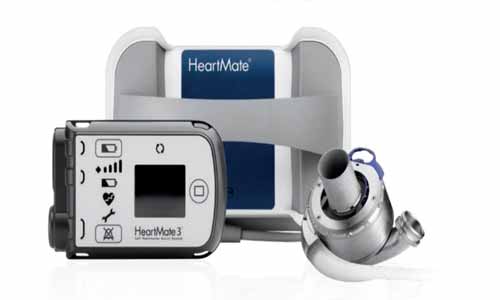- Home
- Editorial
- News
- Practice Guidelines
- Anesthesiology Guidelines
- Cancer Guidelines
- Cardiac Sciences Guidelines
- Critical Care Guidelines
- Dentistry Guidelines
- Dermatology Guidelines
- Diabetes and Endo Guidelines
- Diagnostics Guidelines
- ENT Guidelines
- Featured Practice Guidelines
- Gastroenterology Guidelines
- Geriatrics Guidelines
- Medicine Guidelines
- Nephrology Guidelines
- Neurosciences Guidelines
- Obs and Gynae Guidelines
- Ophthalmology Guidelines
- Orthopaedics Guidelines
- Paediatrics Guidelines
- Psychiatry Guidelines
- Pulmonology Guidelines
- Radiology Guidelines
- Surgery Guidelines
- Urology Guidelines
FDA approves less invasive HeartMate 3 implantation technique

The US Food and Drug Administration (FDA) has granted approval of a new alternative surgical technique for Abbott’s HeartMate 3 Left Ventricular Assist Device that will allow more advanced heart failure patients to avoid open-heart surgery. The new, less invasive approach is designed to provide surgeons with a choice in surgical method for patients receiving the HeartMate 3™ Left Ventricular Assist Device (LVAD), the industry's leading heart pump.
Approximately 615,000 people in the U.S. are living with heart failure and nearly 40% are considered to have reached an advanced stage where traditional therapies no longer work. Heart pumps are small, implantable mechanical devices that pump blood through the body in people whose heart is too weak to do so on its own. People living with a heart pump may be waiting for a heart transplant or may not be candidates for a transplant and will live with the device for the rest of their life.
Historically, heart pumps have been implanted via open-heart surgery. With approval for an alternative surgical technique, Abbott's HeartMate 3 heart pump can now be implanted via lateral thoracotomy – a surgical approach where an incision is made between a patient's ribs to access the heart. Physicians believe that for many patients this technique has advantages over open-heart surgery because it can result in less bleeding and shorter recovery time for patients.
"This is a significant advancement for patients who can now receive a life-saving LVAD through an alternative procedure that can yield shorter hospital stays and a faster recovery," said heart transplant surgeon Igor Gosev, M.D., University of Rochester Medical Center in Rochester, New York. "Heart failure is a crippling and costly disease so being able to offer patients the HeartMate 3 heart pump with this less-invasive approach gives them the opportunity to return to a better quality of life more quickly."
The approval is based on two studies – the ELEVATE study: a multi-center, voluntary, observational registry collecting post-marketing data, and the LAT Feasibility study: a single arm, prospective, multicenter study. Results of the two trials found that bleeding (requiring surgery), infection and arrhythmias were lower in the group implanted via the less-invasive surgical approach than those who underwent open heart surgery.
"We continue to focus on advancing our heart failure devices and techniques to make life better for the patients we serve," said Robert L. Kormos, M.D., medical director for mechanical circulatory support at Abbott. "The first approved LVAD—HeartMate I—was approved more than 25 years ago. Since that time, the technology has evolved immensely. Today's HeartMate 3 device, including its design and size, allows physicians to successfully implant it without having to perform open heart surgery and offers survival rates, as demonstrated in the MOMENTUM 3 clinical trial, at two-years that are comparable to heart transplants."
The HeartMate 3 received approval from the FDA in 2017 for patients with advanced heart failure whose hearts are unable to circulate blood through the body, and are waiting for a transplant, known as bridge to transplant. In 2018, HeartMate 3 was approved as a destination therapy for those individuals who are in need of a new heart but are not eligible for a transplant.

Disclaimer: This site is primarily intended for healthcare professionals. Any content/information on this website does not replace the advice of medical and/or health professionals and should not be construed as medical/diagnostic advice/endorsement or prescription. Use of this site is subject to our terms of use, privacy policy, advertisement policy. © 2020 Minerva Medical Treatment Pvt Ltd